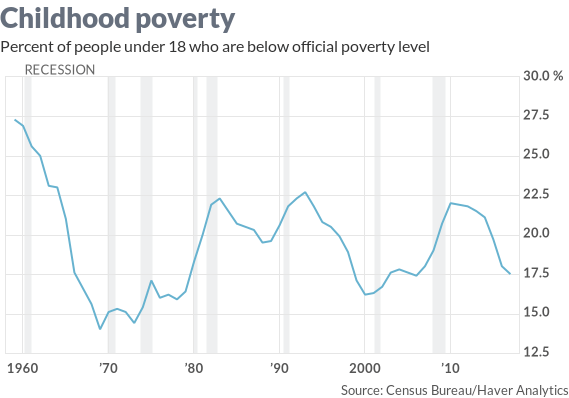Donald Trump is not shy about hiding his disdain for the poor—especially those who are not white.
He infamously referred to developing nations as “shithole” countries and Mexican immigrants and asylum seekers are rapists. His budget cuts go after the nation’s most vulnerable populations, including children and the elderly.
That’s apparently not enough. Now the Trump administration is trying to literally define the poor out existence by artificially lowering a poverty threshold already seen as insufficiently stringent to capture the true ranks of America’s poor.
To do so, the White House Office of Management and Budget is relying on a sneaky, seemingly minor statistical tweak that will have major implications for who will be defined as poor—and thus what government benefits they will be able to claim.
The idea is to select a different inflation measure for annual cost-of-living adjustments than the consumer price index that is currently used, such as the “chained” CPI or the personal consumption expenditures index or PCE.
It sounds innocent enough, but in reality this will mean billions of dollars in cuts to key federal health programs that serve as a lifeline to the country’s neediest populations.

“Either alternative measure would result in a lower poverty line, and the gap between the poverty line under the current versus either of the proposed methodologies would widen each year,” write Aviva Aron-Dine and Matt Broadus of the Center for Budget and Policy Priorities in Washington.
“The administration claims that it seeks to make the poverty line more accurate, but … either change would likely make the poverty line less accurate overall while also increasing the number of people without health insurance and experiencing other forms of hardship.”
The report’s findings are dire. After 10 years it estimates that:
• More than a quarter million senior and disabled individuals would either lose their eligibility for Medicare’s Part D subsidy program, or receive less help from it.
• More than 150,000 seniors and people with disabilities would lose help paying for Medicare premiums, forcing them to pay premiums of over $1,500 per year to maintain basic physician coverage under Medicare.
• More than 300,000 children would lose comprehensive health coverage under Medicaid and the Children’s Health Insurance Program (CHIP), as would some pregnant women.
• More than 250,000 adults who gained access to Medicaid coverage from the Affordable Care Act’s (ACA) expansion would lose it.
• More than 150,000 consumers who buy coverage through the ACA marketplaces would lose eligibility or qualify for less assistance, increasing deductibles by hundreds or even thousands of dollars.
• Tens of thousands would lose eligibility for premium tax credits, driving up their premiums by potentially thousands of dollars.
Put simply, the poverty line is already too narrowly defined, so anything that lowers it further would deprive actual poor people of much-needed resources, including basic nutrition.
“The data show that households just above the poverty line have high rates of material hardship: for example, high uninsured rates and difficulty affording health care, as well as high rates of food insecurity,” the report says.
This is not the first time the Trump administration has dealt with people it considers undesirable by attempting to make them disappear statistically.
The administration is trying, despite ferocious political and court challenges, to introduce a citizenship question into America’s decennial census—even more draconian than the last time such a question was posed in the 1950 census.
In both cases, it’s difficult to separate racism from policy, since Trump’s strongest animus appears reserved for the poorest of our citizens.
In either situation, a victory for Trump would mean a major loss not just for the poor, immigrants and minorities but also for voting rights, political representation, and even sound research—which depends on accurate data collection for its reliability.



